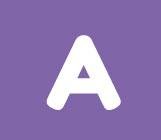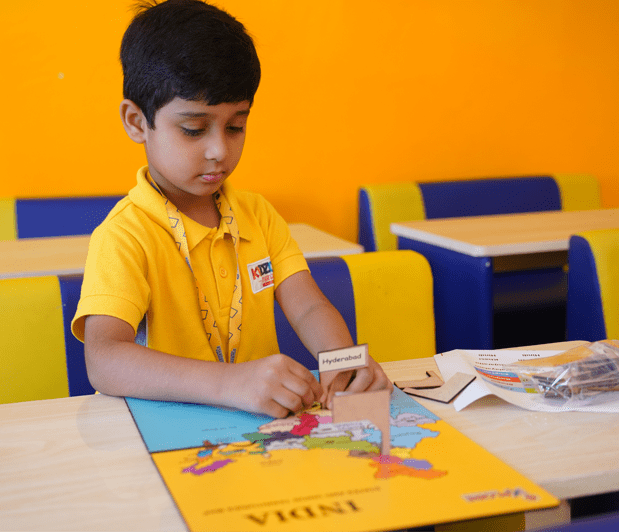Our Curriculum

Learning Through Play is an Art
Nurturing young minds requires skill, for each child possesses a unique personality that may not be immediately evident. At Kidzonia, we cultivate an enthusiastic and nurturing environment, motivating children to freely express their creativity. The foundation of any school lies in its curriculum and pedagogical approach. Our contemporary curriculum revolves around thematic instruction, blending digital and experiential learning. Our mission is to empower young minds from an early age, instilling confidence and a passion for learning, as we understand that children learn best through play and exploration.
Our Educational Approach
Our curriculum incorporates the best practices of renowned educators like Dr. Howard Gardner, Maria Montessori, Friedrich Froebel, Reggio Emilia, Jean Piaget, and Dr. Benjamin Bloom's Taxonomy. This diverse and inclusive approach caters to individual learning styles (auditory, visual, and kinesthetic), ensuring each child thrives in our nurturing environment. Following the Montessori method, our approach promotes hands-on, self-paced, collaborative, and joyful learning, nurturing natural development through a conducive environment. Play-based learning capitalises on children's innate curiosity, engaging them in experiences tailored to their interests, strengths, and evolving skills. We provide a thorough teaching and learning approach based on research on brain function and human learning patterns by using a thematic methodology. Furthermore, experiential learning, defined as learning through reflection on doing, is a cornerstone of our methods, encouraging active engagement. Additionally, our integration of digital learning leverages technology effectively to enhance the learning experience for every child.
Multiple Intelligence

Digital

Experiential

Thematic

Playway

Montessori
Multiple Intelligence
At Kidzonia, we recognise the uniqueness of every child and understand that learning styles vary greatly. Dr. Howard Gardner’s Theory of Multiple Intelligences is the inspiration for our preschool program, ‘DISCOVER.’ Through thematic learning, we blend various educational domains and skills, tailoring our approach to accommodate the diverse needs of all learners.
Thematics & Experiential Learning Thematic learning not only enriches the learning process but also makes it more engaging and meaningful for children. We firmly believe that children learn most effectively when they can relate their lessons to real-life experiences. Kidzonia International Preschool integrates themes across subjects, ensuring that learning is enjoyable and pertinent. Our ‘DISCOVER’ curriculum harmoniously blends traditional Indian values with proven Montessori methods, emphasising active and experiential learning. Additionally, our low teacher-student ratio guarantees individualized attention for each child.
Technology Aided Learning Kidzonia embraces technology to augment learning experiences. Our ‘DISCOVER’ curriculum incorporates a wide array of learning apps, which are accessible through iPads and projectors installed in every classroom.
Thematics & Experiential Learning Thematic learning not only enriches the learning process but also makes it more engaging and meaningful for children. We firmly believe that children learn most effectively when they can relate their lessons to real-life experiences. Kidzonia International Preschool integrates themes across subjects, ensuring that learning is enjoyable and pertinent. Our ‘DISCOVER’ curriculum harmoniously blends traditional Indian values with proven Montessori methods, emphasising active and experiential learning. Additionally, our low teacher-student ratio guarantees individualized attention for each child.
Technology Aided Learning Kidzonia embraces technology to augment learning experiences. Our ‘DISCOVER’ curriculum incorporates a wide array of learning apps, which are accessible through iPads and projectors installed in every classroom.
Our Learning Principles
Our Learning Principles are based on

Animals

Shape Sorter

CVC Reader

Splash Math

Paint Sparkle

Senses

ABC Kids

Innovative Evaluation Methods
Throughout the learning journey, a combination of qualitative and quantitative assessment techniques are employed to provide a comprehensive overview of learning outcomes. Our curriculum not only equips children with a deep understanding of various subjects but also prepares them to navigate the challenges of a competitive world. The focus is on evaluating not just what children have learned but also how effectively they can apply their knowledge to make a difference. Teachers actively contribute to the assessment process by documenting children’s creative endeavours, capturing their progress and participation through photographs, and noting significant milestones and preschooler achievements. Regular Parent-Teacher Meetings (PTMs) serve as a platform to share detailed insights into a child’s overall development, showcase documented work, and foster discussions between parents and teachers. These meetings also facilitate teacher-parent dialogues on future plans, areas requiring attention, and an understanding of the child’s home environment.
